PROFILE
Page 22
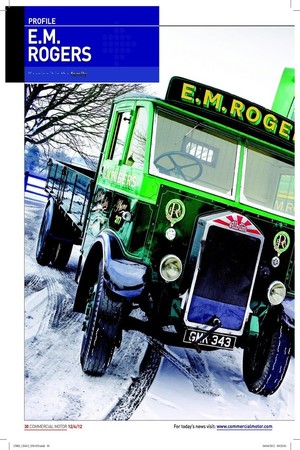
Page 23
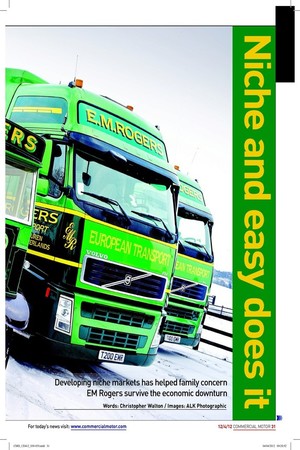
Page 24
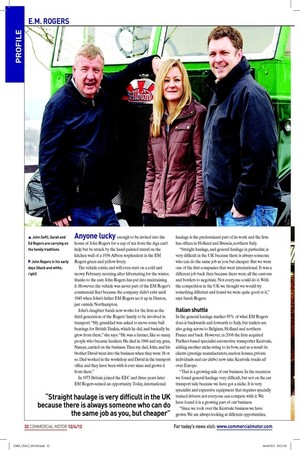
Page 25
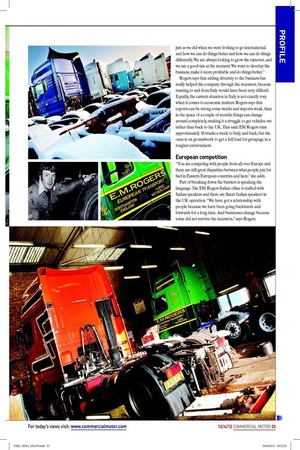
Page 26
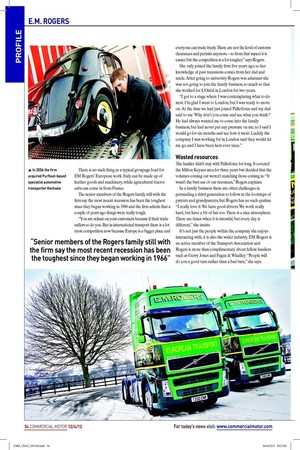
Page 27
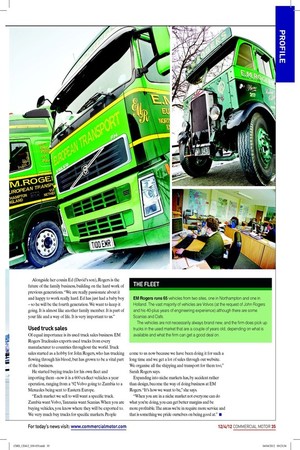
If you've noticed an error in this article please click here to report it so we can fix it.
E.M.
ROGERS
Keeping it in the family
Niche and easy does it
Developing niche markets has helped family concern EM Rogers survive the economic downturn
Words: Christopher Walton / Images: ALK Photographic Anyone lucky enough to be invited into the house of John Rogers for a cup of tea from the Aga can’t help but be struck by the hand-painted mural on the kitchen wall of a 1936 Albion resplendent in the EM Rogers green and yellow livery.
The vehicle exists, and will even start on a cold and snowy February morning after hibernating for the winter, thanks to the care John Rogers has put into maintaining it. However, the vehicle was never part of the EM Roger’s commercial leet because the company didn’t exist until 1945 when John’s father EM Rogers set it up in Duston, just outside Northampton.
John’s daughter Sarah now works for the irm as the third generation of the Rogers’ family to be involved in transport. “My granddad was asked to move some ball bearings for British Timkin, which he did, and basically he grew from there,” she says. “He was a farmer, like so many people who became hauliers. He died in 1966 and my gran, Nancye, carried on the business. Then my dad, John, and his brother David went into the business when they were 18 or so. Dad worked in the workshop and David in the transport ofice and they have been with it ever since and grown it from there.” In 1973 Britain joined the EEC and three years later EM Rogers sensed an opportunity. Today, international haulage is the predominant part of its work and the irm has ofices in Holland and Brescia, northern Italy.
“Straight haulage, and general haulage in particular, is very dificult in the UK because there is always someone who can do the same job as you but cheaper. But we were one of the irst companies that went international. It was a different job back then because there were all the customs and borders to negotiate. Not everyone could do it. With the competition in the UK we thought we would try something different and found we were quite good at it,” says Sarah Rogers.
Italian shuttle
In the general haulage market 95% of what EM Rogers does is backwards and forwards to Italy, but trailers are also going across to Belgium, Holland and northern France and back. However, in 2006 the irm acquired Purleet-based specialist automotive transporter Kentvale, adding another niche string to its bow, and as a result its clients (prestige manufacturers, auction houses, private individuals and car clubs) now take Kentvale trucks all over Europe.
“That is a growing side of our business. In the recession we found general haulage very dificult, but not on the car transport side because we have got a niche. It is very specialist and expensive equipment that requires specially trained drivers; not everyone can compete with it. We have found it is a growing part of our business.
“Since we took over the Kentvale business we have grown. We are always looking at different opportunities, just as we did when we were looking to go international, and how we can do things better and how we can do things differently. We are always looking to grow the turnover, and we are a good size at the moment. We want to develop the business, make it more proitable and do things better.” Rogers says that adding diversity to the business has really helped the company through the recession, because running to and from Italy would have been very dificult. Equally, the current situation in Italy is not exactly rosy when it comes to economic matters. Rogers says that exports can be strong some weeks and imports weak, then in the space of a couple of months things can change around completely, making it a struggle to get vehicles out rather than back to the UK. That said, EM Rogers runs approximately 18 trucks a week to Italy and back, but the onus is on groundwork to get a full load for groupage in a tougher environment.
European competition
“You are competing with people from all over Europe and there are still great disparities between what people pay for fuel in Eastern European countries and here,” she adds.
Part of breaking down the barriers is speaking the language. The EM Rogers Italian ofice is staffed with Italian speakers and there are luent Italian speakers in the UK operation. “We have got a relationship with people because we have been going backwards and forwards for a long time. And businesses change because some did not survive the recession,” says Rogers. There is no such thing as a typical groupage load for EM Rogers’ European work. Italy can be made up of leather goods and machinery, while agricultural tractor cabs can come in from France.
The senior members of the Rogers family still with the irm say the most recent recession has been the toughest since they began working in 1966 and the irm admits that a couple of years ago things were really tough.
“You are reliant on your customers because if their trade suffers so do you. But in international transport there is a lot more competition now because Europe is a bigger place and everyone can trade freely. There are not the level of customs clearances and permits anymore – so from that aspect it is easier, but the competition is a lot tougher,” says Rogers.
She only joined the family irm ive years ago, so her knowledge of past recessions comes from her dad and uncle. After going to university Rogers was adamant she was not going to join the family business, so much so that she worked for L’Oréal in London for two years.
“I got to a stage where I was contemplating what to do next. I’m glad I went to London, but I was ready to move on. At the time we had just joined Palletforce and my dad said to me ‘Why don’t you come and see what you think?’ He had always wanted me to come into the family business, but had never put any pressure on me, so I said I would go for six months and see how it went. Luckily the company I was working for in London said they would let me go, and I have been here ever since.”
Wasted resources
The haulier didn’t stay with Palletforce for long. It covered the Milton Keynes area for three years but decided that the volumes coming out weren’t matching those coming in. “It wasn’t the best use of our resources,” Rogers explains.
In a family business there are often challenges in persuading a third generation to follow in the footsteps of parents and grandparents, but Rogers has no such qualms. “I really love it. We have good drivers. We work really hard, but have a bit of fun too. There is a nice atmosphere. There are times when it is stressful, but every day is different,” she insists.
It’s not just the people within the company she enjoys interacting with, it is also the wider industry. EM Rogers is an active member of the Transport Association and Rogers is more than complimentary about fellow hauliers such as Gerry Jones and Fagan & Whalley: “People will do you a good turn rather than a bad turn,” she says.
Alongside her cousin Ed (David’s son), Rogers is the future of the family business, building on the hard work of previous generations. “We are really passionate about it and happy to work really hard. Ed has just had a baby boy – so he will be the fourth generation. We want to keep it going. It is almost like another family member. It is part of your life and a way of life. It is very important to us.”
Used truck sales
Of equal importance is its used truck sales business. EM Rogers Trucksales exports used trucks from every manufacturer to countries throughout the world. Truck sales started as a hobby for John Rogers, who has trucking lowing through his blood, but has grown to be a vital part of the business.
He started buying trucks for his own leet and importing them –now it is a 600 ex-leet vehicles a year operation, ranging from a ’92 Volvo going to Zambia to a Mercedes being sent to Eastern Europe.
“Each market we sell to will want a speciic truck. Zambia want Volvo, Tanzania want Scanias. When you are buying vehicles, you know where they will be exported to. We very much buy trucks for speciic markets. People come to us now because we have been doing it for such a long time and we get a lot of sales through out website. We organise all the shipping and transport for them too,” Sarah Rogers says.
Expanding into niche markets has, by accident rather than design, become the way of doing business at EM Rogers. “It’s how we want to be,” she says.
“When you are in a niche market not everyone can do what you’re doing, you can get better margins and be more proitable. The areas we’re in require more service and that is something we pride ourselves on being good at.” ■
THE FLEET
EM Rogers runs 65 vehicles from two sites, one in Northampton and one in Holland. The vast majority of vehicles are Volvos (at the request of John Rogers and his 40-plus years of engineering experience) although there are some Scanias and Dafs.
The vehicles are not necessarily always brand new, and the firm does pick up trucks in the used market that are a couple of years old, depending on what is available and what the firm can get a good deal on.











































